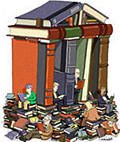 Two good articles appeared recently about re-reading. Roger Angell of The New Yorker and Verlyn Klinkenborg of The New York Times both talk about the joys of returning to favorite books.
Two good articles appeared recently about re-reading. Roger Angell of The New Yorker and Verlyn Klinkenborg of The New York Times both talk about the joys of returning to favorite books.
Here’s Verlyn (we’re on a first-name basis, at least I am):
Part of the fun of re-reading is that you are no longer bothered by the business of finding out what happens.... I’m able to pay attention to what’s really happening in the language itself—a pleasure surely as great as discovering who marries whom, and who dies, and who does not. (The New York Times 5/29/09)
For Book Clubs
Use part of a meeting to talk about books any of you have re-read—and why (why re-read and why that book?). Was re-reading a different experience—more interesting, or less? Have you read any book more than twice, thrice...?
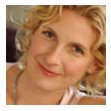 So pretty. So Blonde. So articulate. Did I mention thin? On top of that, she writes Eat, Pray, Love, a terrific besteller. (Me? I’d have called it Eat, Eat, Eat…but then it’s her book, and as I said, she’s thin.)
So pretty. So Blonde. So articulate. Did I mention thin? On top of that, she writes Eat, Pray, Love, a terrific besteller. (Me? I’d have called it Eat, Eat, Eat…but then it’s her book, and as I said, she’s thin.)
I ran across her on a video interview on the "Barnes & Noble Studio" page, Meet the Authors. It’s fun place to visit—good interviews with interesting authors.
Also check out Borders Book Club, another set of videos featuring an Ann Arbor, Michigan, book club that invites top authors in to speak.
Book Clubs can get some good ideas of books to read, authors to check out, discussion questions to ask. The videos are interesting enough to play in your meetings.
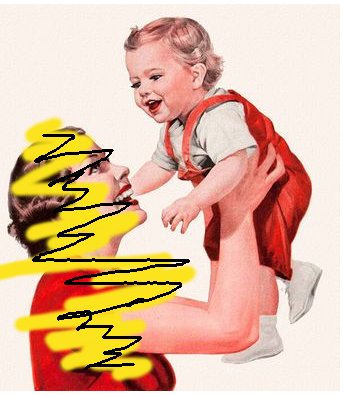 Warning: if you ever find yourself in the position of being a fictional mom, look out—there's a risk you'll get BUMPED OFF.
Warning: if you ever find yourself in the position of being a fictional mom, look out—there's a risk you'll get BUMPED OFF.
It could happen during the course of your novel… or even BEFORE the novel even begins.
Here's why: the author may have destined your daughter for a great literary adventure; maybe she's slated to become one of literature's most renowned heroines. If that's the case, SORRY, MOM, you've gotta go.
Literature's spunkiest, most independent HEROINES—the ones we admire and remember most fondly?—they're motherless:
Moll Flanders (1721)
Fanny Hill (1749)
Emma (1815)
Jane Eyre (1847)
Rebecca of Sunnybrook Farm (1903)
Nancy Drew (1930…)
Rebecca (Daphne du Maurier) 1938
More recently, we've been graced with the heroines of Ahab’s Wife and Amy Bloom’s Away, both of whose mothers die.
What's wrong with mothers? Well, traditionally, a mother's role has been to instill proper behavior — to correct for waywardness — especially in their DAUGHTERS. And mothers are fierce protectors of their offspring, keeping them out of harm's way.
Yet literature's greatest heroines are placed squarely in the path of HARM'S WAY, right where their authors want them—but where any mom worth her salt doesn't. So a character who would restrain improper or dangerous behavior must be GOTTEN RID OF. Dumped. That would be a mother.
Today, most moms aren't so old-fashioned. We want our girls to enjoy a WEALTH of human experience — education, career, and travel, as well as family life. Even so, I'm not so sure many of us would want our girls sneaking aboard a whaling ship, let alone working in a brothel like Moll Flanders — which means an author would have to WRITE US OUT of the storyline. Oh, well…
Don't miss these later LitBlog posts on getting rid of literary moms:
#MomsAreMad About Books
Where is My Mother?
Ideas for book clubs
- Think of other books featuring independent heroines in which mothers are done away or are simply never present.
- Think of books with father-and-son or father-and-daughter adventures.
- Prove my theory wrong: come up with some mother-daughter adventure stories.(Okay… Little Women. Any others?)
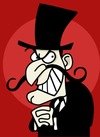 Do we have to love a book's main character? What happens if we despise the hero/heroine?
Do we have to love a book's main character? What happens if we despise the hero/heroine?
I just read a blurb for Zoe Heller's new book, Believers. Critics are praising it up and down, though some find the characters unlikable ... can’t relate to them ... even find them NASTY!
So, back to my question. Can we enjoy a book without liking its characters? Love the book, hate her—as in Serena, another recent book with a heroine no one can stand.
How about Emma—Jane Austen’s masterpiece? Even Austen knew her dear readers would have trouble liking her control-freak-of-a-heroine. Then there's Lolita, featuring one of the most dastardly heroes in all of literature? Humbert Humbert is surely enduring if not endearing—and the book is considered one of the great works of the 20th century.
Still ... it’s hard to get into a book when characters are unlikable. Am I alone? Probably not.
Questions for Book Clubs
- Can a bad character ruin a good book?
- How do you begin most of your book discussions—by talking about the characters? And if you don’t like the main character...where does the discussion go? Does it peter out?
- If a character is unlikable, is it intentional on the part of the author? To what end?
 A NY Times article (2/25/09) pondered whether a Liberal Arts education will be around much longer. Recent trends suggest maybe not.
A NY Times article (2/25/09) pondered whether a Liberal Arts education will be around much longer. Recent trends suggest maybe not.
When I taught English, a number of students resented the time my class took from their studies in science & technology or business & finance. Those are the disciplines that would pay them good money . . . and pay off their tuition loans. But English? What good is it?
You can talk till you’re blue in the face—and I did—about the power of language, about the importance of clear thinking and coherent, persuasive writing—the things liberal arts teach us.
After all, it was Bethany McClean, a former English major who first cracked the Enron scandal—because, as she said, she knew the right questions to ask. There are lots of stories like that.
And I talked about how the humanities explore the important questions of life—
How does one lead a good life in a not-so-good world?
What does it mean to be human?
But, honestly? $20,000 a year is a lot money to spend on trying to figure out what your humanity’s about.
So maybe the pursuit of liberal arts is a luxury we can no longer afford. That’s what more than a few in the ivory towers are suggesting.
Questions for Book Clubs
- If college humanities courses fall off a cliff . . . will book clubs pick up the slack? After all, to read and discuss books is to engage the very questions posed by humanities.
- But then who said book clubs are supposed to solve society’s problems? Isn’t our roll simply to enjoy reading and sharing ideas, large or small?
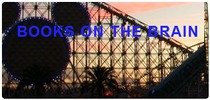 Books on the Brain.com Check out my guest column on one of the best book blogs on the Net. I talk about the fact that book clubs are saving the world for democracy!
Books on the Brain.com Check out my guest column on one of the best book blogs on the Net. I talk about the fact that book clubs are saving the world for democracy!
Had you any idea how important you were?
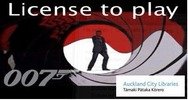 Gotta toot my own horn. When I started my LitLovers website, I’d no idea how it might be used . . . or that readers around the globe would tune in.
Gotta toot my own horn. When I started my LitLovers website, I’d no idea how it might be used . . . or that readers around the globe would tune in.
A library site in Auckland, New Zealand, uses LitLovers as part of their web 2.0 training exercise—and what a cool site to be listed on. Take a look.
Lots of libraries have training blogs to teach staff how to maneuvre the new world wide web (web 2.0)—which refers to the new level of interactivity on the Net—sites like Del.ic.ious, StumbleUpon, GoodReads, FaceBook, Wikipedia, LibraryThing, and personal blogs.
LitLovers has been used on a number of library training sites in the US, but the New Zealand one is a particularly gratifying! Spend some time on it yourself—we can all learn more about this new web environment.
 I’ve plowed through a pile of books lately and thought it would be fun to share some thoughts with you.
I’ve plowed through a pile of books lately and thought it would be fun to share some thoughts with you.
The Lay of the Land (Richard Ford): This book spends 600 pages following a middle-aged guy through 3 days of his life. The math’s easy. . .200 pages per day and not much happens. But I adore this book. The writing is simply brilliant: funny, wry, and filled with provocative, even life-altering insights.
The Sign for Drowning (Rachel Stolzman): a beautiful, slender  novel about the Deaf commnity, written with elegance and compassion. I loved it, especially because it’s a debut novel!
novel about the Deaf commnity, written with elegance and compassion. I loved it, especially because it’s a debut novel!
 The Ten Year Nap (Meg Wolitzer): Right from the opening paragraph, you know you’re in good hands. Here's how she writes about the morning sounds waking women up all over the country:
The Ten Year Nap (Meg Wolitzer): Right from the opening paragraph, you know you’re in good hands. Here's how she writes about the morning sounds waking women up all over the country:
There were wind chimes and roaring surf, and the electronic approximation of birdsong and other gentle animal noises. All of it accompanied the passage of time, sliding forward in liquid crystal. Almost everything in these women’s homes required a plug.
That last line is priceless—funny and knowing. The women in this novel are all plugged in and nowhere to go.
Winter in Madrid (C.J. Sansom): a huge best-seller coming from Britain. I had high hopes. . . but it’s melodramatic to the max. Things like “tears pricked” (his eyes, or at the corners of his eyes) get used 4 times within the first 60-some pages. In fact, lots of tears get shed by lots of characters. Also, this: She…ran the comb through her thick auburn hair. It flowed in waves.” Or this: “Her heart was starting to thump with excitement.” Okay, truthfully, it gets better. Still, where’s Graham Green when you need him. . .or Robert Ludlum?
I had high hopes. . . but it’s melodramatic to the max. Things like “tears pricked” (his eyes, or at the corners of his eyes) get used 4 times within the first 60-some pages. In fact, lots of tears get shed by lots of characters. Also, this: She…ran the comb through her thick auburn hair. It flowed in waves.” Or this: “Her heart was starting to thump with excitement.” Okay, truthfully, it gets better. Still, where’s Graham Green when you need him. . .or Robert Ludlum?
 The Known World (Edward P. Jones): I’m late coming to this powerful book, about slavery, especially African Americans who owned slaves. Morally complex and wonderfully written. Jones won the Pulitzer in 2004.
The Known World (Edward P. Jones): I’m late coming to this powerful book, about slavery, especially African Americans who owned slaves. Morally complex and wonderfully written. Jones won the Pulitzer in 2004.
The Story of Edgar Sawtelle (David Wroblewski): You’ve got to love dogs and Hamlet, and I do. Dense, digressive (especially about the genetics of dog breeding), brooding and, yes, tragic (it is, after all, a retelling of Hamlet). But this is a gorgeous, satisfying read. I love this book. So does Oprah (we’re so much a like).
Hamlet). But this is a gorgeous, satisfying read. I love this book. So does Oprah (we’re so much a like).
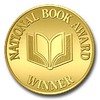 Occasionally, I get emails from readers troubled by how hard of some of the older works are to read—18th and 19th century novels. I feel their pain.
Occasionally, I get emails from readers troubled by how hard of some of the older works are to read—18th and 19th century novels. I feel their pain.
Great works are rarely easy breezy reads—think Dostoevsky, Melville, Hawthorne, Eliot, Faulkner, James, Conrad. These aren't the authors we lug to the beach. They all write books that are challenging for a host of reasons, not least of which is length. Their books also involve complex language and diction, arcane allusions and metaphors, and heady philosophical issues.
Even authors of a more recent vintage can be tough to tackle—Vladamir Nabokov, Salman Rushdie, Margaret Atwood, Don DeLillo, Thomas Pynchon—especially because of their post-modernist bent...which, among other things, means they constantly undercut their own meaings.
Here's the question: Should book clubs tackle the “great works” of literature? Does doing so make a club more "legitimate"? If so, in whose eyes?
Or is this a non-issue, completely irrelevant to the purpose of our book clubs...and especially to the pleasure we derive from them? Still...it's interesting to ponder.
Questions for Book Clubs:
- Is it enjoyable to read the "great works"? Which ones? Are they challenging in a good way—or too challenging to enjoy?
- Does reading critically acclaimed books, contemporary or classic, make us "better people"... or just give us bragging rights?
- If we choose not to read the "big" authors, are we missing out on something? If so...what?
 Do you ever find yourself mourning the end of a book—you finish the last sentence, and it's like saying goodbye to a dear friend?
Do you ever find yourself mourning the end of a book—you finish the last sentence, and it's like saying goodbye to a dear friend?
I’d been reading Richard Ford’s The Lay of the Land. By the time I reached the end, I’d become so caught up in Frank Bascombe’s mind—his life and his ideas about life—that it was hard to leave him.
Then I turned around to start a new book, and I found it hard. Like making new friends—it required energy and commitment.
Do I even like these people? Do I really want to spend time with them? Do I want to make the effort to learn all about them? Hopefully, we stick with the book, to the point where the story sucks us in—and we beoome engaged once again. Of course...then it's eventually goodbye.
Questions for Book Clubs
1. Which books have been hard ones for you to end—it feels like saying goodbye to dear friends?
2. Which books have you had difficulty getting caught up in? You’re not sure you’ve got the energy or interest to invest in getting to know a new group of people.
